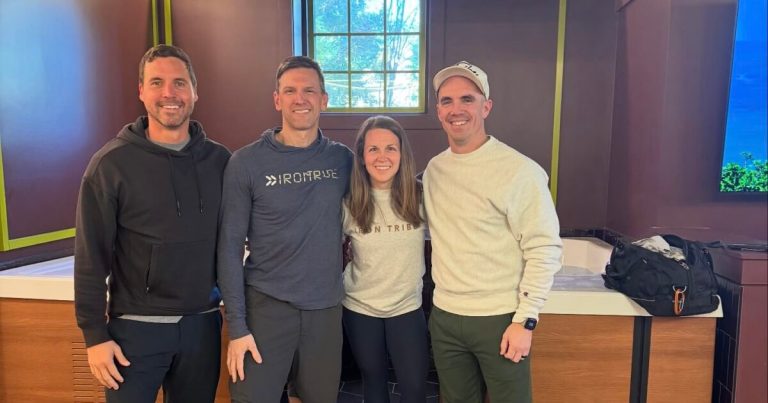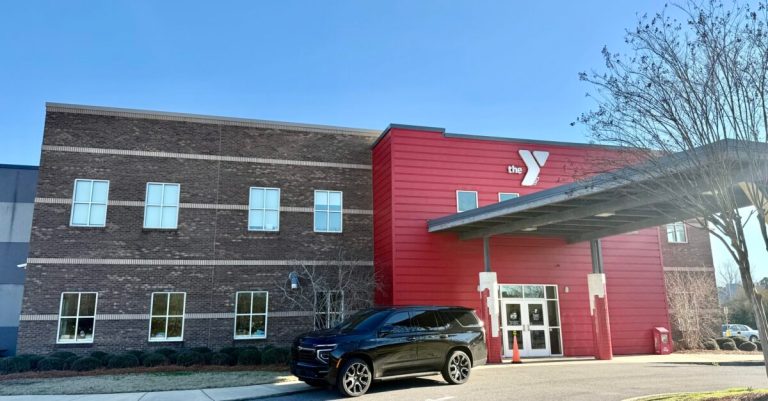Reviewed by: Callie Morrison
This local clinic offers hope for treatment-resistant depression, PTSD + more
Reading time: 5 minutes
Sponsored

At a young age, Dr. Harrison Irons saw the devastation depression could wreak on a family when his best friend’s brother took his own life.
Since then, the Board Certified Anesthesiologist and Pain Management Specialist has learned many ways to relieve unnecessary suffering, whether from physical or mental causes.
Keep reading to learn about the Vestavia clinic he and his business partner established to do just that.
Meet Dr. Irons

Dr. Harrison Irons grew up in Huntsville and lives in downtown Birmingham with his wife, who he met at the Louis Bar at The Pizitz.
The two of them enjoy the food and entertainment scene, outdoor adventures and live music.
A self-avowed “mediocre adult league hockey player,” he loves the sport and plays year-round. And, you may catch him on riding his motorcycle—sometimes with his dog in the sidecar.
Learning about ketamine
During his pain management fellowship at the University of North Carolina, Chapel Hill, Dr. Irons began noticing a correlation between the physical and mental relief patients got from ketamine infusions for conditions like Complex Regional Pain Syndrome (CPRS).
“When you get to know a pain population, you notice that there’s a lot of comorbid anxiety and depression—that’s just the nature of the disease. When we were working with CRPS patients, you could tell that not only was their pain improved, but so was their mood.”
Dr. Harrison Irons, Southern Ketamine
Years later, Irons met his now business partner, John Runyans when Runyans would come in to administer anesthesia at the local pain clinic where Dr. Irons worked.
The pair have built Southern Ketamine from the ground up to provide relief for the following mood conditions:
- Anxiety
- Depression
- OCD (Obsessive-Compulsive Disorder)
- PTSD (Post-Traumatic Stress Disorder)
- Substance Use Disorder
- Suicidal Ideation
We sat down with Dr. Irons at Southern Ketamine get the scoop on three popular myths about the medicine.
Myth #1: Is ketamine a horse tranquilizer?

According to Dr. Irons, the short answer is yes, but ketamine was first approved for human use by the Food and Drug Administration in 1970 as an anesthetic and sedative agent.
“As it turns out, many of the same medications used in human medicine are also utilized in veterinary medicine as we share very similar physiology to our fuzzy friends. Ketamine has a unique property to it as it causes sedation without depression of the respiratory drive, which makes it an excellent sedating agent in the veterinary world.”
Dr. Harrison Irons, Southern Ketamine
While the use of ketamine for treatment-resistant depression and other mood disorders has generated a lot of interest in the past few years, it is still considered an “off-label” use by the FDA, and therefore not routinely covered by insurance.
Myth #2: Isn’t ketamine a party drug?
The answer is yes, people have abused this medication as a “party drug” for decades.
“Unfortunately, many drugs that are used for specific and legitimate medical purposes have been recreationally abused, including but not limited to: fentanyl, amphetamines and even cocaine.”
Dr. Harrison Irons, Southern Ketamine
The key, though, according to Dr. Irons, is how the drug is received.
In the clinic, they administer a medically-supervised, low-dose infusion of pharmaceutical-grade ketamine.
Myth #3: Is ketamine addictive?

Ketamine is classified as a Schedule III drug by the FDA, which means there is a low—but not zero—chance of addictive potential.
Dr. Irons said that ketamine is often used to help people with addiction issues.
“Addiction and mental health go hand in hand, so a lot of times when people are depressed, they try to figure out an escape. They’ll turn to substances, and that can turn into abuse.
Because of this, if you can treat the underlying disorder with ketamine, they no longer need to turn to substances for coping.”
Dr. Harrison Irons, Southern Ketamine
To counter the risks, patients come into the clinic for the lowest-dose infusion and continuous monitoring of their vital signs during treatment.
Getting started

Because the treatment is not routinely covered by insurance, it does not need to go through the rigorous insurance approval process.
This means that rather than being referred by a primary care physician or psychiatrist, patients who have been suffering for a long time can reach out to the clinic directly where they will be assessed by a medical provider.
Step-by-step, here’s what happens:
- Call or visit the website to submit an inquiry for more information.
- Someone from the clinic will reach out + provide information to review.
- The next step is to schedule an onboarding consultation. This can either be on the phone or in person, and includes medical + medication trial history.
- Patients who meet the criteria can schedule their first infusion.
Not everyone is a good fit, and they often refer patients out to therapists, psychologists or psychiatrists for other treatment modalities.
How it works

- How often: 6 infusions over a 2-4-week period, with patients often experiencing rapid relief of symptoms in nearly 85% of patients
- Boosters: Usually people come back every 2-6 months for a single booster infusion
“Patients often feel like their old selves again, like they can live their lives. They have a renewed outlook on life, where they’re not weighed down by the burden of their depression. Colors are brighter, their moods are lighter; they can engage in relationships better. We are just trying to restore more of that vitality and ability to lead a normal life.”
Dr. Harrison Irons, Southern Ketamine
Call Southern Ketamine at 205.557.2253 or visit their website today.
Sponsored by:




